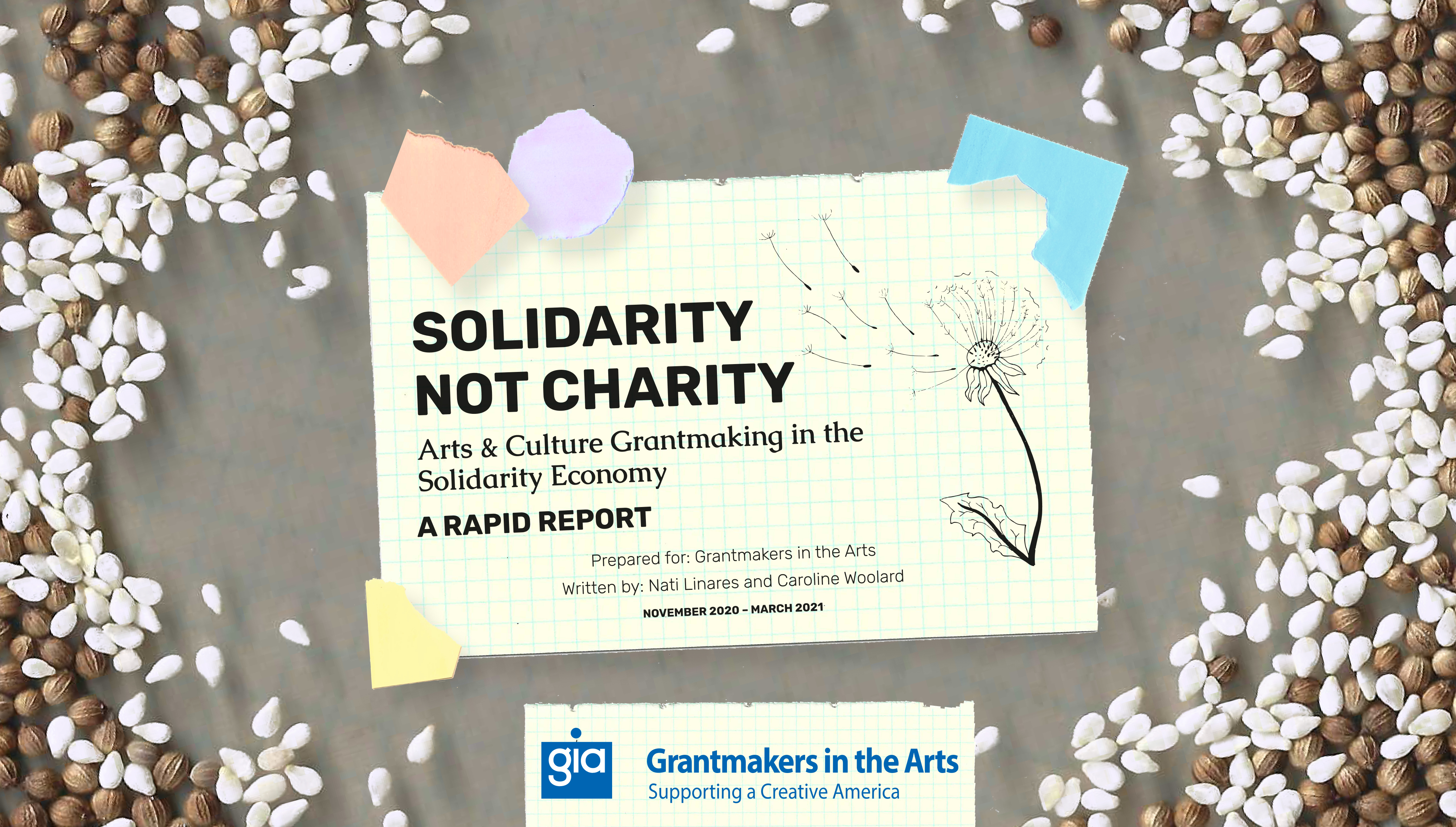Grantmakers in the Arts Releases Report on Arts and Culture Grantmaking in the Solidarity Economy

New York, NY - Wednesday, March 24. Grantmakers in the Arts (GIA) just released Solidarity Not Charity: Arts & Culture Grantmaking in the Solidarity Economy, a report that explores how the grantmaking community can support culture-workers and artists through an increasingly just economy.
Commissioned by GIA with funding by William and Flora Hewlett Foundation, Kenneth Rainin Foundation, and Barr Foundation, the report and its interactive website share an overview of the Solidarity Economy, culture-workers’ role in it, and what grantmakers may do to support it through recommendations and an action checklist.
For this report, authors Natalia Linares, communications manager at New Economy Coalition and Caroline Woolard, an artist, educator and fellow at Center for Cultural Innovation, interviewed grantmakers, artists, advocates, scholars, lawyers, and economists in order to inform the recommendations for arts and culture grantmakers on how they can engage in systems-change work that addresses root causes rather than symptoms of cultural inequity.
The authors explain the cultural sector is actively seeking alternatives to business-as-usual to create economic and racial justice in the sector and beyond. “This work is not new. Creatives are ‘going back to the future’ to practices of shared livelihoods rooted in cultural traditions,” Caroline Woolard and Natalia Linares remind us. In that sense, grantmakers can play a role in the transformation of the sector by following the lead of BIPOC creatives who are innovating models for self-determination and community wealth.
“Caroline Woolard and Natalia Linares’ recommendations will help grantmakers in the arts become investors in culture – broadening how we support culture and who we support,” said Eddie Torres, GIA president & CEO.
Nadia Elokdah, GIA vice president & director of programs, emphasized “this report amplifies and builds upon decades of organizing work, often led by BIPOC communities, and grantmaking priorities that center cultural and economic self-determination. We are at an inflection moment in grantmaking, and we are called to learn from these recommendations, engage in new types of relation, and actively participate in shaping a different kind of future for our field.”
“The Solidarity Not Charity report is transformative, linking locally focused work to an international movement and helping our grantmaker community make the connection between supporting cultural self-determination and supporting economic self-determination for our communities and the nation,” said GIA Board Chair and Kenneth Rainin Foundation Director of Arts Strategy & Ventures, Ted Russell.
“Artists and culture-bearers were already suffering from low wages and precarity and for many, the COVID-19 pandemic was the final blow to their livelihoods. Around the world, culture bearers and creative workers are spreading the seeds of something better; 'Solidarity Not Charity: Arts & Culture Grantmaking in the Solidarity Economy' shares highlights from the movement to build a just economy that prioritizes people and the planet over endless profit, a superstar system and unsustainable growth,” explains Natalia Linares, one of the authors.
Linares adds: “From artist-owned and governed enterprises, to efforts to build community control of the resources all people need to survive, we have the tools to build a transformative culture that inspires many more people to resist oppressive systems and build life-affirming ones. That is the power of culture, to renew our collective imaginations and push people everywhere to sow systems-change at the root."
One of the interviewees of this report, Allen Kwabena Frimpong, co-founder of ZEAL, mentions “philanthropy has an opportunity to be in solidarity with communities in enacting cultural restitution and reparations through participatory grant-making, so that those arts institutions and ecosystems are equitably invested in through a solidarity economy.”
“I would encourage folks to recognize that this work is happening across the country. In fact, the new economy is already here—whether or not we choose to see it is another story. … I invite folks to check out this work and get involved,” said Dana Kawaoka-Chen, co-director of Justice Funders, another interviewee of this report.
This report brings into consideration important questions such as the ones posed by Janelle Orsi, from the Sustainable Economies Law Center: “How can we not just put out the fires of the world, but to build the solutions that can replace the destructive systems, to create community wealth? How can we invest in things that are stable and build assets in our communities?”
Explore the report and interactive website here. Please share this report in your communities and networks, using the hashtag #GIArts.
Grantmakers in the Arts (GIA) is a national association of private and public arts funders, including large independent foundations, family foundations, community foundations, national, state and local arts agencies, and nonprofit organizations that make grants to artists and arts organizations. The organization’s funding focus areas -racial equity in arts philanthropy, support for individual artists, arts education, and capitalization- are at the core of its work. GIA provides communication services, research, and regional and national convenings for arts funders. For more details about GIA visit www.giarts.org or its social media sites, Twitter, Facebook, Instagram, LinkedIn and YouTube.
Grantmakers in the Arts media contact: Carmen Graciela Díaz, Communications and Publications Manager: carmen@giarts.org
To contact the authors or for interview requests with interviewees, you can email Caroline Woolard at carolinewoolard@gmail.com.
